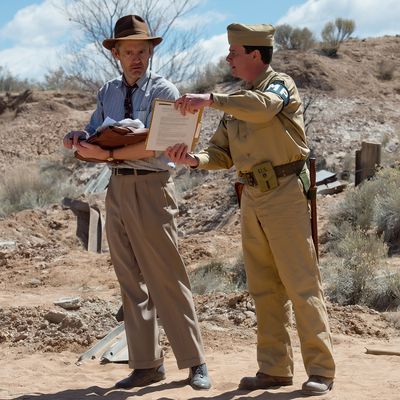
If you needed further proof that the expository requirements of TV pilots are almost always the enemy of good drama, watch Manhattan, which debuted Sunday and repeats tonight on WGN at 10 p.m. (and that Vulture’s Margaret Lyons weighed in on last week). Then watch the second episode, which airs this coming Sunday, and appreciate another handsomely produced and reasonably intelligent period series, which, in the Mad Men vein, is about moral relativity as well as psychology.
The pilot for this series about the development of the atom bomb is choked with dutiful résumé-reciting (“This is the youngest buck who ever won the Forbes prize!”) and awkwardly inserted backstories and surprising revelations that aren’t that surprising, plus a cliff-hanger ending that’s meant to keep you on the hook, breathlessly awaiting closure, even though you don’t know the cliff-hangered character well enough to give a hoot what happens to him. The second episode is much more relaxed and confident, as well it should be. Having successfully eaten television’s mandated opening appetizer of raw fennel, it’s ready to move on to dishes that please the palates of everyone involved. You can practically hear the entire series sighing with relief that they’ve gotten the hard part over with.
Set in the New Mexico desert in 1943, the show joins the Manhattan Project already in progress. Overseen by physicist J. Robert Oppenheimer (who’s kept offscreen, Kurtz-like, until the pilot’s final section), the show is a scientific race-against-the-clock story that doubles as a workplace show. Frank Winter (John Benjamin Hickey, characteristically excellent, though in a tiresomely self-righteous role) is heading a team that’s trying to develop a bomb that would later be known as Fat Man; a rival team within the same secret unit is trying to develop Thin Man. One is an implosion-based bomb, the other a plutonium gun-type of bomb.
The commingling of professional competitiveness, nagging guilt over developing a super-weapon, and paranoia over secrecy and surveillance is compelling. None of the scientists are allowed to tell their wives what, exactly, they’re up to, though they want to, and you just know that sooner or later one of them will crack and let some pertinent facts out. Also intriguing are the contrasts between the mundane daily realities of life for Frank and his botanist spouse Liza (Olivia Williams of Rushmore), or junior physicist Charlie Isaacs (Ashley Zukerman) and his wife Abby (House of Cards’ Rachel Brosnahan), and the pervasive mood of dread on the base, which is identified by the government only by its P.O. box number and is subject to security-based witch hunts for leakers and spies. Excellent supporting players abound (my favorite is Daniel Stern’s Glenn Babbit, with his rabbinical beard and knowing grin), and the period details are persuasive without being ostentatious. (“Whose son will die at the last minute of the war?” asks a sign looming on the wall of a barracks.)
Still, Manhattan doesn’t really start to find its footing until the second episode, which is filled with scenes that don’t merely advance the plot but that instead enhance the atmosphere, even create a sense of delight for delight’s sake: a shot of a bed sheet fluttering in the air like a pirate’s mainsail heralds a domestic accident, the entire sequence scored to Carmen Miranda music, and there’s a great bit of everyday black-marketeering that involves swapping tampons for peyote to acquire yet a third item. The show feels a little bit too nice, a little too PG — even an against-the-wall make-out session and a moment of woman-on-woman flirtation feel oddly chaste, even anthropological — but the show still fascinates. And when it decides not to worry about pushing its pre-ordained plot forward and instead lets its characters discuss Schrödinger’s cat, it develops a smart, original, almost funky vibe.


